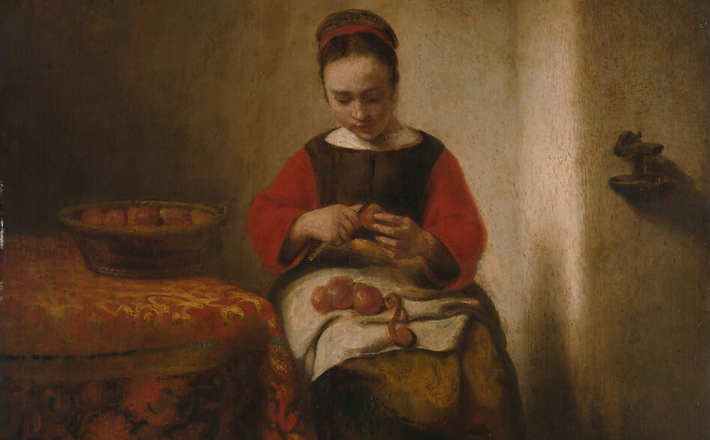Commentary on Amos 8:1-12
Amos is a social justice prophet.
We remember his famous line: “Let justice roll down like waters” (5:24).
He’s concerned foremost about justice in his society. He’s troubled by the treatment of the poor and rejected, those, as Howard Thurman identifies, “with their backs against the wall.” Therefore, this prophet, who understands himself foremost as a herdsman and dresser of sycamore trees (7:14), travels from his home in the south to the northern kingdom of Israel to prophesy.
What societal wrongs are so severe as to cause a sheep breeder to leave his home and country?
What is God’s prophetic calling all about?
The people’s offense has almost entirely to do with how they treat each other. It’s ethical. Amos 2:6–8 makes this clear:
Thus says the Lord:
For three transgressions of Israel,
and for four, I will not revoke the punishment,
because they sell the righteous for silver
and the needy for a pair of sandals—
they who trample the head of the poor into the dust of the earth
and push the afflicted out of the way;
father and son go in to the same young woman,
so that my holy name is profaned;
they lay themselves down beside every altar
on garments taken in pledge;
and in the house of their God they drink
wine bought with fines they imposed.
The prophet is upset at the sight of the oppression of the poor. Amos is clear that sacrifices alone—that is, pious religious rituals only—do not bring praise to God. Proper worship is not the only facet of a vibrant spiritual life. In fact, offering sacrifices to God while treating your neighbor poorly is simply bad religion to Amos. It’s hypocrisy, an offense to the covenant relationship between Israel and God.
During the mid-8th century BCE, the northern kingdom of Israel enjoyed some prosperity because of the lack of threat from the major empires of this period. Egypt was weak; Assyria was in decline. So, even though Israel was a small kingdom in the face of a larger empire such as Assyria, they lived in peace during this time. These peaceful moments, however, led to an accumulation of wealth by some folks and to unethical treatment of the poor. Some people in the ruling class of the kingdom of Israel treated the poor and disenfranchised badly.
In sum, it was a time of economic inequality.
Today, we know about this type of inequality as well. For example, regarding income inequality, the United States contains significant disparity: “Between 1979 and 2021, the average income of the richest 0.01 percent of [United States] households … grew nearly 27 times as fast as the income of the bottom 20 percent of earners.”1 Concerning global wealth inequality, the small-in-number wealthy own a substantial amount: “According to the UBS Global Wealth Report, in 2023 the world’s richest 1 percent, those with more than $1 million, owned 47.5 percent of all the world’s wealth.”2
So, what’s the prophetic word from Amos during Israel’s moment of injustice?
Amos 8 contains a vision (verses 1–3) and an oracle (verses 4–12).
Amos’s vision in 8:1–3 follows three earlier visions in Amos 7. Each vision begins with the formulaic “This is what the Lord GOD showed me.” The object of the vision this time is a basket of summer fruit. While some scholars seek to find a deeper meaning in this choice, the image is likely chosen primarily to create a wordplay in the original Hebrew. The word for “summer fruit” is qayits, and the word for “end” is qets. The prophet uses similar-sounding words to craft a message.
Just as ripe fruit will ultimately spoil and come to an end, the kingdom of Israel is at its end. The time of judgment has arrived.
To be clear, the end imagined here is not the end of the world. It’s the end of the kingdom of Israel. The people’s commitment to injustice is bringing about the kingdom’s fall.
The oracle that follows provides additional details about this judgment. Certain folks are accused of trampling on the poor; merchants are condemned for their fraudulent practices. Therefore, both the land and the community will suffer. The land will experience the consequences of humanity’s practice of injustice.
And, finally, God will bring about a famine—not of bread but of God’s word. Prophecy will be scarce. How will the people know what to do in this terrible moment? How will they receive knowledge of God? Not listening to God through God’s prophet may in fact cause God through God’s prophet to stop speaking.
Notes
- Institute for Policy Studies, “Income Inequality in the United States,” Inequality.org, accessed June 23, 2025, https://inequality.org/facts/income-inequality/#income-inequality.
- Institute for Policy Studies, “Global Inequality,” Inequality.org, accessed June 23, 2025, https://inequality.org/facts/global-inequality/.


July 20, 2025